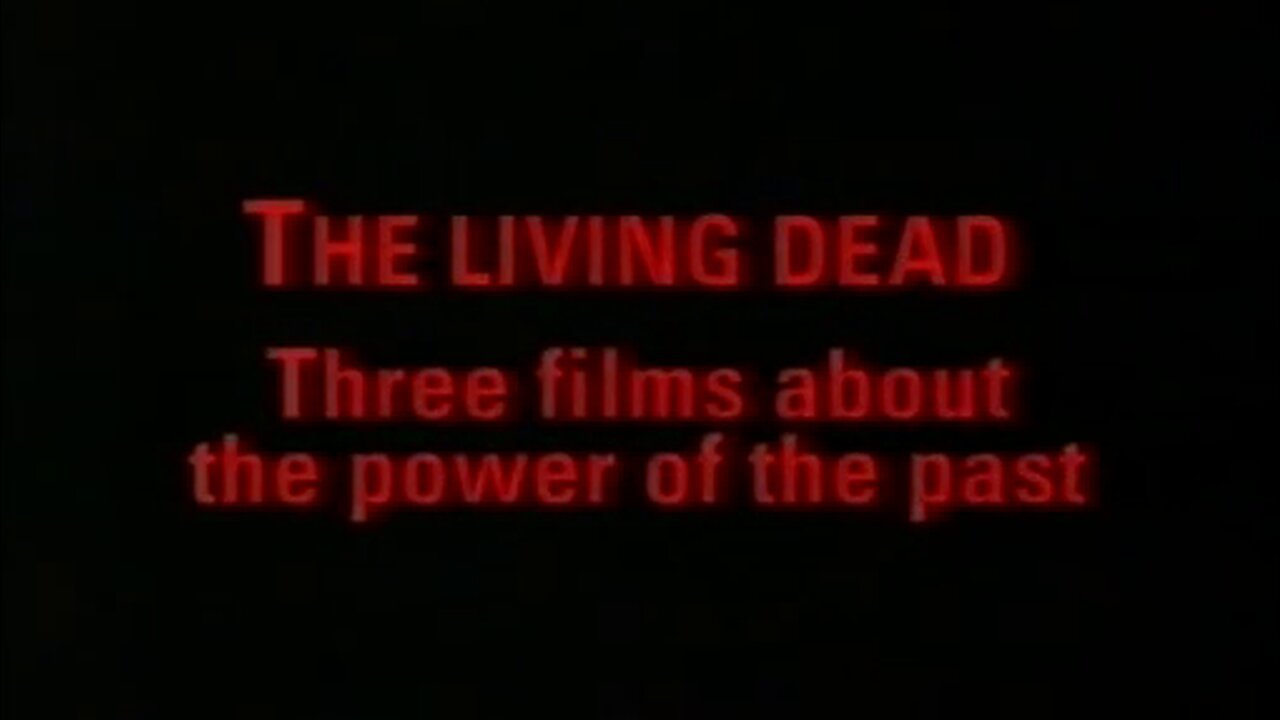Premium Only Content

Adam Curtis | The Living Dead: Three Films About the Power of the Past | (1995)
Adam Curtis playlists:
Miscellaneous https://rumble.com/playlists/H5NqdFg4G4U
Can't Get You Out Of My Head | (2021) https://rumble.com/playlists/dfM0eugWsFI
All Watched Over by Machines of Loving Grace | (2011) https://rumble.com/playlists/UEeqeUNA5tM
The Trap - What Happened to Our Dream of Freedom | (2007) https://rumble.com/playlists/F9hYmAMJPNM
Russia 1985-1999 TraumaZone | (2022) https://rumble.com/playlists/I12Kd8gTf8A
The Living Dead: Three Films About the Power of the Pastis the second majorBBCtelevisiondocumentaryseries by British filmmakerAdam Curtis. It was originally broadcast onBBC Twoin 1995.
In the series, Curtis examines the different ways that history and memory (both national and individual) have been used and manipulated by politicians and others.
Part 1. "On the Desperate Edge of Now"
This episode, broadcast on 30 May 1995, examines how the various national ideals and memories of theSecond World Warwere effectively buried, rewritten and manipulated in theCold Warera, only to violently resurface later with events such as theprotests of 1968, the emergence of theRed Army Faction, and the turmoil of theYugoslav Wars.
For Germany, this process began at theNuremberg Trials, where the use of the filmThe Nazi Planwas intended to reveal the criminality of the Nazi state, and attempts were made to prevent defendants—principallyHermann Göring—from providing any rational or contextualized argument for their actions during the war. Subsequently, however, bringing lower-ranking Nazis to justice was all but forgotten in the interests of maintainingWest Germanyas an important new ally in the Cold War. Forthe Allies, faced with a new enemy in theSoviet Union, there was a need to portray World War II as a crusade of pure good against pure evil, even if this meant creating a mismatch by denying the memories of the individual soldiers who had actually done the fighting and knew it to have been far more ambiguous.
The title of this episode comes from a veteran's description of the uncertainty of survival in combat. A number of American veterans related how, years later, they found themselves plagued with previously suppressed memories of the brutal things they had seen and done.
Part 2. "You Have Used Me as a Fish Long Enough"
In this episode, broadcast on 6 June 1995, the early history of theCentral Intelligence Agency's (CIA) use ofbrainwashingand mind control is examined. Its thesis is that a search for control over the past, via medical intervention, had to be abandoned, and that in modern times, control over the past is more effectively exercised by the manipulation of history. It concludes that despite successful attempts to remove memories of the past, doing so often left an emotional void that was hard to refill.
The angle pursued by Curtis is the way in whichpsychiatry historicallypursuedtabula rasatheories of the mind, initially to set people free from traumatic memories and then later as a potential instrument of societal control. The work ofEwen Cameronis surveyed, with particular reference to the early medical use ofelectroconvulsive therapy, Cold War theories ofcommunistbrainwashing, and the search forhypnoprogammedsleeper agents and assassins. After the intelligence agency failures over theKennedy assassinationand the failedassassination attempts against Fidel Castro, this work was later abandoned in favour of computerised memory and intelligence research, such as theDefense Advanced Research Projects Agency(DARPA), created in 1958.
The title of this episode comes from aparanoid schizophrenicseen in archive film in the programme, who believed that her neighbours were using her as a source of amusement by denying her any privacy—like agoldfishin a bowl. Some footage from this episode, an interview with one of Cameron's victims, was later reused by Curtis inThe Century of the Self.
Part 3. "The Attic"
In this episode, broadcast on 13 June 1995, the national aspirations ofMargaret Thatcherare examined, particularly the way in which she used public sentiment in an attempt to capture the national spirit embodied in the famous speeches and writings of the wartime prime minister,Winston Churchill. Curtis argues that by harking back, or summoning the spirit of Britain's "glorious past", to fulfil short-term political or national ends, the process backfired in the long-run, trapping the invoker in the societal maladies of the present day.
The example provided is the wartime levels of patriotism invoked in theFalklands Warcrisis, in which Thatcher's rugged determination matched national sentiment, only to dissipate a few years later with events such as thepoll taxriots, which contributed to her resignation.
The title is a reference to the attic flat at the top of10 Downing Streetcreated during Thatcher's refurbishment of the house which did away with the prime minister's old living quarters on the lower floors, replacing them with 18th-century boardrooms. Scenes fromThatcher's premiershipare intercut with scenes from thepsychological horrorfilmThe Innocents (1961), a film adaptation ofHenry James's novellaThe Turn of the Screw.
-
 57:43
57:43
The StoneZONE with Roger Stone
4 hours agoWhat Will The JFK Assassination Files Reveal? | The StoneZONE w/ Roger Stone
31.8K8 -
 18:24
18:24
Tundra Tactical
7 hours ago $5.61 earnedWhats New With HRT Tactical Gear at SHOT Show 2025
50.1K6 -
 23:27
23:27
Rethinking the Dollar
7 hours agoWealth Protection SECRETS Learned from Wildfires w/ Paul Stone
57.9K11 -
 59:28
59:28
Flyover Conservatives
23 hours agoInsider Reacts to Trump’s 100 Hours: Davos, WHO, Climate Change, DEI… - Alex Newman | FOC Show
41.6K4 -
 1:04:30
1:04:30
Battleground with Sean Parnell
10 hours agoPresident Trump Is Flooding The Zone
127K12 -
 2:12:53
2:12:53
We Like Shooting
16 hours ago $0.62 earnedWe Like Shooting 595 (Gun Podcast)
16.6K -
 2:00:28
2:00:28
megimu32
5 hours agoON THE SUBJECT: 90s Toys, Fat Phobia, and Crying Libs!
25K2 -
 LIVE
LIVE
Right Side Broadcasting Network
14 hours agoLIVE REPLAY: President Trump Addresses House GOP in Doral, FL - 1/27/25
3,427 watching -
 2:37:19
2:37:19
Robert Gouveia
8 hours agoTrump Addresses House Republicans; Tulsi Confirmation Fight; CIA Lab Leak
56.1K27 -
 54:38
54:38
LFA TV
1 day agoMankind Refuses the Way of Peace | TRUMPET DAILY 1.27.25 7pm
48.6K4